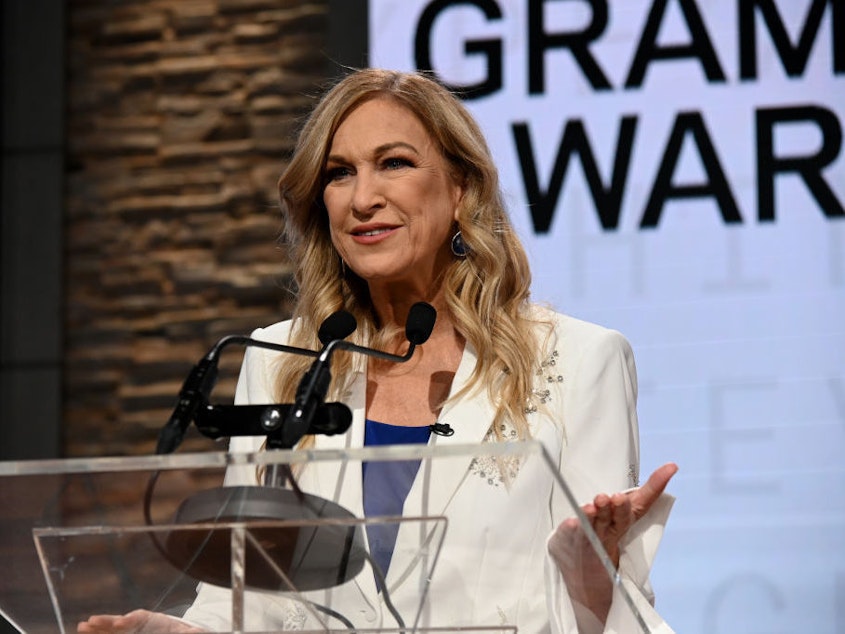Ousted Female Chief Files Discrimination Complaint Against The Grammys

In the latest chapter of palace intrigue at the Grammy Awards, its short-lived president and CEO Deborah Dugan — the organization's first female chief executive — announced Tuesday afternoon she is filing a discrimination complaint with the Equal Employment Opportunity Commission (EEOC) against the Recording Academy, the organization that gives out the Grammys.
Dugan's dismissal became public last Thursday, just ten days before this year's Grammy Awards telecast, which will take place on Sunday. She was announced as the organization's leader last May, and took up her post in August.
As recently as last month, Dugan was giving interviews in which she promised "a major restructuring" of the Grammys. The pledged changes included meeting concrete, measurable goals meant to add greater gender and racial diversity to the awards process, and to ensure voting and membership transparency across the awards, and the Academy.
In a statement issued Tuesday afternoon, her attorneys Douglas H. Wigdor and Michael J. Willemin said: "The complaint that we filed today against the National Academy of Recording Arts and Sciences (NARAS, the Academy's former full name) highlights tactics reminiscent of those deployed by individuals defending Harvey Weinstein."
Wigdor also represents a Jane Doe, one of the women who is slated to testify in the Weinstein trial, which is getting underway in New York.
Sponsored
The lawyers' statement continues: "The attempt by the Recording Academy to impugn the character of Deborah Dugan is a transparent effort to shift the focus away from its own unlawful activity. This blatant form of retaliation in corporate America is all too common, even post #MeToo, and we will utilize all lawful means necessary to ensure that those responsible are held accountable for their actions."
In a longer statement sent to NPR Tuesday afternoon, the lawyers continued: "From the very beginning of her employment as the Recording Academy's first female CEO and president, Ms. Dugan complained about and attempted to remedy the lack of diversity, sexual harassment and other improprieties at the Academy (which were gender-based), including egregious conflicts of interest, improper self-dealing by board members, voting irregularities with respect to nominations for Grammy Awards and other misconduct. In response to her complaints, as alleged, the Academy unlawfully retaliated against Ms. Dugan by placing her on administrative leave (only after she indicated her intent to commence legal action and refused to settle her claims on terms dictated by the Academy), threatening Ms. Dugan with termination and publishing false and defamatory statements about Ms. Dugan to the media. Moreover, as of just yesterday, as alleged, the Academy's interim CEO and President, Harvey Mason Jr., penned and published a false, retaliatory and defamatory letter designed to 'get out in front' of this charge and further destroy Ms. Dugan's reputation."
Since Dugan's sudden ouster, the Recording Academy and its erstwhile leader have exchanged dueling narratives in the trade press about the reasons for her dismissal.
A statement from the Academy last Thursday stated, "In light of concerns raised to the Recording Academy board of trustees, including a formal allegation of misconduct by a senior female member of the Recording Academy team, the Board has placed Recording Academy President and CEO Deborah Dugan on administrative leave, effective immediately."
But Dugan's camp argued to the New York Times the same day that the real reason for her dismissal was linked to a memo that she had sent the Academy's HR department three weeks prior, in which she voiced the concerns her lawyers referenced, including issues about "exorbitant and unnecessary" legal bills — including some $15 million paid to two outside law firms between the years 2013 and 2017.
Sponsored
One of Dugan's attorneys, Bryan Freedman, tweeted on Friday: "What has been reported is not nearly the story that needs to be told. When our ability to speak is not restrained by a 28-page contract and legal threats, we will expose what happens when you 'step up' at the Recording Academy, a public nonprofit."
Freedman was referring to an infamous 2018 comment made by Dugan's predecessor, Neil Portnow, in which the former Grammy chief opined that women working in the music industry would need to "step up" in order to be recognized. (In 2002, Portnow replaced Michael Greene, who was forced to resign after allegations that he had sexually harassed and abused another Academy executive became public.) The New York Times identified the woman accusing Dugan as Portnow's former assistant, who claimed that Dugan has a "bullying" style of managing employees.
On Monday, the Academy alleged via Billboard that Dugan had offered to resign and drop her own accusations against the organization in exchange for a $22 million payout. Similar accusations were repeated by the Academy board president, Harvey Mason Jr., in a memo sent to Grammy members, in which Mason also claims that Dugan made her allegations only after the Academy began its investigation of her.
Most recently before her Grammys appointment, Dugan led Red, the nonprofit group dedicated to fighting HIV/AIDS across Africa that was co-founded by U2's Bono and Bobby Shriver. Before joining Red, Dugan was a lawyer, an executive at the EMI Record Group and a former president of Disney Publishing Worldwide. [Copyright 2020 NPR]
